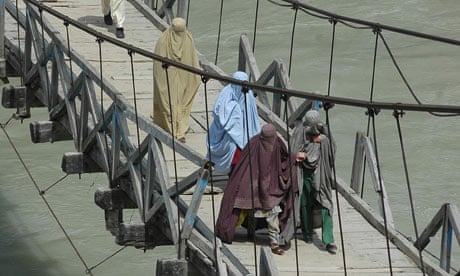Pakistani commandos were dropped behind Taliban lines by helicopter to seize control of the main town in the Taliban-infiltrated district of Buner in fighting that killed 50 militants, the military said.
The battle for Buner, 60 miles north of the capital, Islamabad, is considered an important test of the government's ability to push back a wave of Taliban fighters spilling out of the Swat valley, where a contentious peace agreement is under strain.
Fighter jets bombed Taliban positions on hilltops around Dagger town while ground troops pushed in from three directions, meeting stiff resistance, said military spokesman Major General Athar Abbas.
The army made no mention of civilian casualties. However a Daggar resident, reached by phone, said that many villagers had been wounded in artillery attacks on Taliban positions in the surrounding mountains.
Some wounded were being treated at a small private hospital in the town, said the man, who requested anonymity.
"There are too many casualties – no blood, no medicine and the people don't have access to a proper hospital," he said. Fighting was fiercest around a strategic bridge leading into the valley, where militants exploded several roadside bombs, he said. The immediate goal was to link the special forces controlling Dagger, who were seen rappelling into the town, with regular forces approaching by road.
The assault was complicated by the kidnap of 70 security personnel from a police station. Abbas said 18 had been "recovered" without offering further details.
Roads into Buner were sealed and mobile phone lines were cut off. Residents were confined to their homes.
"Helicopters are moving over our heads and we can hear the sound of explosions," said Abdul Ahad Khan by telephone from Rustum, a village just outside Buner.
A reporter with al-Jazeera was shot twice when his vehicle came under fire as it travelled from Buner to Swat. His condition was "stable", the army spokesman said.
It was the second day of an operation to drive up to 500 militants from the district, which occupies a strategically important position close to a reservoir and the city of Mardan.
The army is under pressure to prove its mettle after a week of withering criticism from American officials who worry that Pakistani instability poses a "mortal threat" to world security.
Pakistani officials insist such fears are overblown and the Taliban threat can easily be contained.
World attention focused on Buner last week after Taliban fighters occupied government buildings and looted western aid vehicles. Although Islamabad was never in direct danger, US officials viewed the development as a red line and accused Pakistan of "abdicating" to the Islamists.
The offensive started on Sunday in Lower Dir district, where the army said it killed 75 militants and lost 10 paramilitary soldiers. An estimated 30,000 people have been displaced, the provincial government said.
The expansion into Buner puts renewed pressure on the controversial Swat peace deal, signed in February despite a chorus of international criticism.
Speaking from his Swat stronghold, the militant spokesman Muslim Khan said he considered the peace deal to be dead in every district except for Swat. If the army deployed fresh troops to Swat "then we will be fighting again", he said.
Sufi Muhammad, an ageing jihadi fighter who helped negotiate the peace accord, has not been seen since fighting resumed. A spokesman said all talks had been suspended until the army operation ended.
However, the peace deal was not entirely dead. A senior official with the Awami National party, which governs the province, said its new strategy was to expel the Taliban from adjoining districts through force but to preserve the peace deal in Swat.
Amid rising tensions in Swat, reporters have already come under fire. Yesterday, tracts appeared in the valley, signed by the leader of a suicide bomb squad, warning reporters to write "positive" stories about the Taliban or face the consequences.
Khan, the Taliban spokesman, confirmed the new edict. "Under sharia law, if you tell a lie you must be punished," he said.
